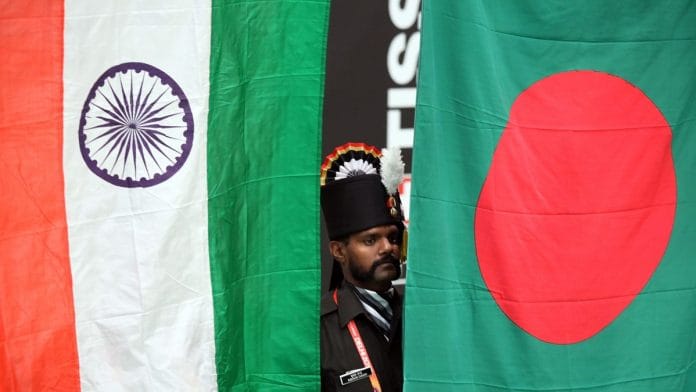Thank you dear subscribers, we are overwhelmed with your response.
Your Turn is a unique section from ThePrint featuring points of view from its subscribers. If you are a subscriber, have a point of view, please send it to us. If not, do subscribe here: https://theprint.in/subscribe/
It was 3.15 in the afternoon when the WhatsApp message from Dhaka hit ground.
Ahh PEACE
What Happened?
Hasina chorer moto palalo (Hasina fled like a thief)
This wasn’t from any bigot. It was from a lady, a fashionable, well-travelled senior executive in international trade. One of my several friends in Bangladesh.
From thereon, a kaleidoscope of interactions with Bangladeshis chugged into memory, in Dhaka, in Chittagong, and occasionally in my hometown of Bangalore, where they often descend for medical treatment.
Recurring Theme
Looking back, I missed the first cue a good ten years ago. Over an elaborate dinner at a friend’s place in upmarket Gulshan in Dhaka.
“I like Begum Zia.”
I was about to blurt out – HOW COULD YOU? But gagged myself just in time. I knew she is wealthy, sings Rabindra Sangeet and used to dance in the Prabhat Pheri (morning festive processions) every Poila Boishakh (1st of Baishakh, the Bengali New Year). I prodded her with a few harmless, politically leading questions.
“I don’t like Hasina’s arrogant, dictatorial ways,” came the retort.
Over the next few years of my visit to Bangladesh, I came across this ‘don’t like Hasina’ refrain, again and again, mostly expressed subtly, sometimes in confiding whisper. And from unexpected quarters. But it grew sharper after every questionable election.
Orphaned
My closest contact in Bangladesh was Jameer Bhai (name changed), a Mukti-yoddha (freedom fighter) of 1971 Liberation War, a diehard supporter of Sheikh Hasina’s Awami League, and a secular to the core. We lost Jameer Bhai last year to a massive heart attack, but I can still hear his disquiet voice as he once rued about the political constellation of the Hindus in Bangladesh. “You know, they say in America about the Afro-Americans? The Republicans don’t care as they don’t vote for them, and the Democrats don’t care as they have no option but to vote for them. Politically, my Hindu friends are in a similar state in Bangladesh.”
More recently, I was frantically trying to contact my friends in Bangladesh – across religious and political divide – during disturbances and internet blackouts. The first message from a Hindu friend which trickled through was: Dada, things are bad. Police fled from their posts. I am worried about our future.
The most wrenching social media post was from Jameer Bhai’s daughter – a college lecturer and a young mother. She writes: How could you do this to us? We, who stood by you at all times. Blackening our faces, leaving us to the slew of taunts, jeers and veiled threats.
Bangladeshi’s India
On several occasions over the years, Bangladeshis have complained to me – It’s easier to get a US visa than an Indian one.
Mandarins of our Foreign Office might have their own explanations, but it baffles me, why the legal procedure is made so arduous when it is relatively easy to sneak into India illegally. More so, when the demography of these two sets fetch contrasting economics.
About the legal visitors, a recent report in Business Standard says, 9.23 million Bangladeshis visited India last year, bringing in Rs 24,707 crore in foreign exchange. Among them, the largest section were tourists, representing 22.5 percent.
Till early this year, Bangladeshi tourists to Kashmir and Himachal Pradesh almost rivalled in number to those for medical treatment to Kolkata, Chennai and Bangalore.
India may well have its geo-political compulsions to back the Hasina government throughout her period of questionable democracy. But the majority of the Muslim population of Bangladesh have no such obligation. So, over the past years, their increasing anger for Hasina was easily fungible toward anger for India.
Beyond Optics
The season is high on optics. Bangladesh had banned export of Bengali’s favourite Hilsa fish. This is understandable. The current authorities have to cater to the sentiments of the agitated mass and cool things down, even at the expense of economics. However, even setting aside B2B goods like cotton or auto-parts, at the everyday transaction level, from toothpaste to food products, Bangladesh is economically twined with India to the extent which common Bangladeshis may be in denial at this moment.
Hasina period had seen a huge upsurge in their entrepreneurial spirit. As a Bengali, I often contrasted it to the entrepreneurial decline in West Bengal. How long would it take to get people-to-people business back on track?
For the Bangladeshi, the political wound may take time to heal, provided no new major contention erupts (which is a big IF). Concerns about the new-found influence of Islamists have started to spout in their own social media. Things are too fluid for any attempt at crystal gazing. Still, we can hope to fly again – on a wing and a prayer.
The author, Ashis Dutta is a Bangalore based software entrepreneur and a freelance writer in mainstream newspapers (The Hindu, Deccan Herald), travel and inflight magazines. He has also published in Bangladesh in Prothom Alo – a major newspaper, and Banglanews24.com portal. He is the author of the book, Gandhi and the London Cabby.
These pieces are being published as they have been received – they have not been edited/fact-checked by ThePrint


